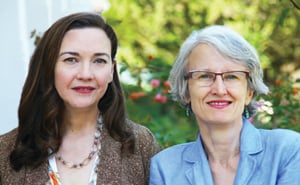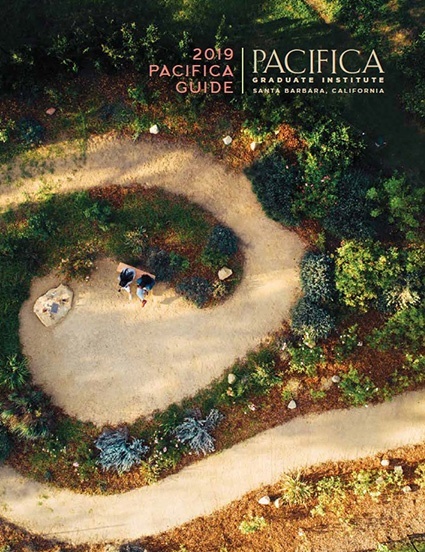An Interview by Angela Borda of Mary A. Wood & Susan Rowland, Part I of III
 Pacifica’s Engaged Humanities program is led by the dynamic team of Susan Rowland, Ph.D., Jungian scholar, and Mary. A. Wood, Ph.D., a visual arts, writer, and artist mentor, who focuses on Jungian and archetypal approaches to creativity. Sitting down with them, I am immediately struck by their sense of learnedness. One of the things I like best about Pacifica faculty is their way of thinking carefully about questions and answering in an eloquent, deep way. And I’m curious to hear about their program, which looks at creativity through the lens of depth psychology and is described as a “unique low-residency program that allows graduate students to find rich sources of inspiration in the humanities.”
Pacifica’s Engaged Humanities program is led by the dynamic team of Susan Rowland, Ph.D., Jungian scholar, and Mary. A. Wood, Ph.D., a visual arts, writer, and artist mentor, who focuses on Jungian and archetypal approaches to creativity. Sitting down with them, I am immediately struck by their sense of learnedness. One of the things I like best about Pacifica faculty is their way of thinking carefully about questions and answering in an eloquent, deep way. And I’m curious to hear about their program, which looks at creativity through the lens of depth psychology and is described as a “unique low-residency program that allows graduate students to find rich sources of inspiration in the humanities.”
How did you come to teach at Pacifica Graduate Institute?
Mary A. Wood: Like so many of our students, I’ve never confined myself to just one role or profession. In addition to my teaching and co-Chairing in the Engaged Humanities program, I’m still very active as a visual artist; I also maintain a private practice as an artist’s mentor. I’ve discovered that my life path mirrors those of a number of our students: We’re contemporary “Renaissance people” in that we thrive on variety and may have a number of diverse projects going at any given time for various clients or employers. The concept of transdisciplinarity is foundational to our program and I’ve realized that it’s also been a foundational way of life for me, and for a lot of our students.
Susan Rowland: My degrees are in literature first from Oxford University, then London University, then Newcastle, and my research has been largely in Jung and literature. I did some extra teaching at Essex Centre for Psychoanalytic Studies where they have Jungian degrees, and that’s how I eventually arrived at Pacifica. I fell in love with an American poet and he is now artist-in-residence to both these programs: Joel Weishaus. He comes to every residential and is available to talk to students about their creative work. At Pacifica I’m teaching Jungian depth psychology-based courses and in the humanities it’s very much including literary specialties and even a Shakespeare course. My latest book is called Jungian Literary Criticism: the Essential Guide, which kind of sums it all up.
You function beautifully as co-chairs of this program. What is it like to work together and how would you describe the program?
Susan Rowland: Mary and I as co-chairs are really complementary because I’ve been teaching for a long time and published scholarship for a long time, but I appreciate her help on the practical creative side. Mary has a really distinguished career as an artist and is now a scholar and teacher as well. So together this works brilliantly for the program because it’s all about students developing creativity using depth psychology and humanities resources. Our students range from established creatives, painters, poets, and script writers to students who come because they’ve never had a chance to be creative and they want a chance to develop it, their own psyches and skills. So we see the program as a special kind of scholarly arena to develop creativity, practice, and research skills. This includes a lot of rigorous work within the humanities, especially when looking at problems in the world today like climate change and social justice. But the program is also a place where students develop by using depth psychology techniques, and it’s a collaborative, generative environment. I’ve always seen this as an alternative to MFA’s, where students are forced to compete to prepare them to go out into the market of the creative world. I think about half those MFA students would be much better off doing this program. It’s not about competition, it’s about creating a community of support of generativity. It really works. Twice a year our graduating students do a presentation on their journey through the program, and these are extraordinarily good and powerful. Everyone comes together and sees where the program can take them. That’s one of the things that’s unique about the program and really works.
Mary A. Wood: Rather than focusing exclusively on technique or fitting into the marketplace, people in the program look at the deepest motivations of creativity, what drives creativity, the relationship between consciousness and the unconscious. We dive very deeply into questions such as: “Where does inspiration truly come from?” “How can depth psychological concerns such as archetypes, archetypal images, symbols, synchronicity, and individuation inform, and even transform, a creative life?” and “What is the role of the creative individual in contemporary societies?” among many other vital questions. Our students learn unique techniques associated with Jungian and archetypal psychologies, including how to work with dreams and other spontaneous creations of the creative psyche. Our students love that our program combines academic rigor with the opportunity to produce new creative work each quarter as part of their coursework. One of the hallmarks of our program is that creative expression and scholarly expression are not seen as mutually exclusive ways of making knowledge and meaning—like the symbol of the caduceus, they are deeply intertwined and continually inform each other. Scholarly inquiry can be highly creative and soulful, while creative expression and art-making can be a powerful mode of inquiry.
Susan Rowland: Students undergo transformation through the processes of the program with dynamic and creative courses. We also encourage and help students to present their work at conferences, and I’ve been working recently on arts-based research, which is a new thing in the academy, it’s something that could be very powerful for Pacifica as a whole because depth psychology is all about creativity. We’re developing it through working with the students in the program.



